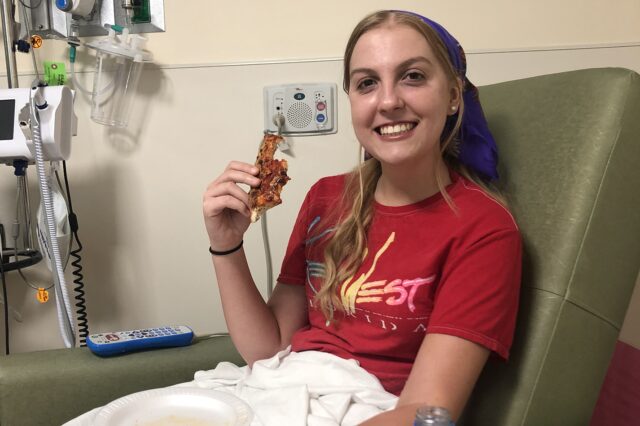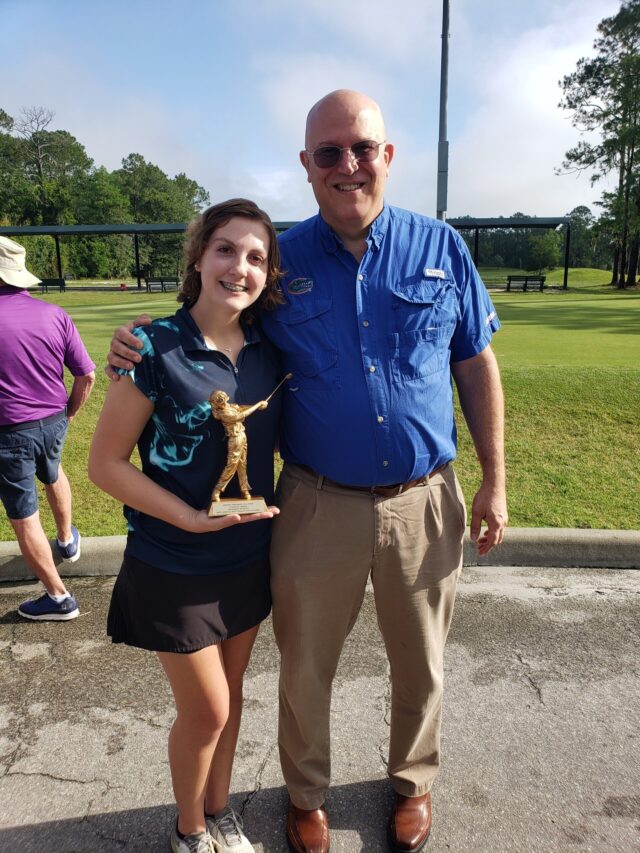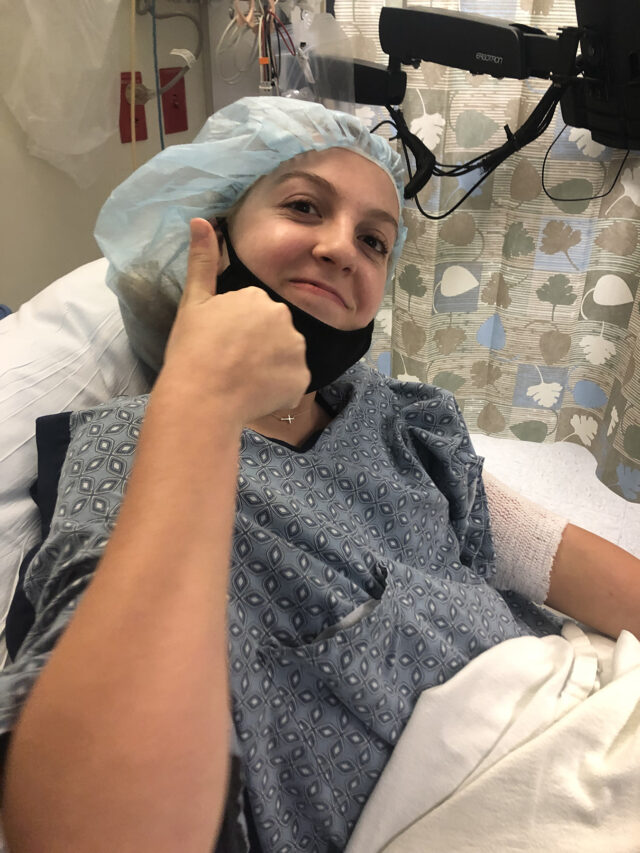Savannah Has No Time 'Fore' Cancer

As a young teenager, Savannah was an accomplished student-athlete who played on her high school’s girls golf team. She had been practicing with the team and competing in golf matches when she noticed an ongoing cough. Thinking it was allergies, 16-year-old Savannah continued to play. After an off-and-on fever began to develop, her mom urged her to go to their neighborhood urgent care center.
There she was told she had a viral infection and to return if her symptoms didn’t improve within a week. One week later, Savannah was still coughing, so she returned to the urgent care center — but only after she finished another round of golf.
She was tested for COVID-19 and with three golf matches coming up, she was ecstatic the result was negative. But then health care providers took a chest X-ray that revealed a massive spot in the middle of her chest. Next, they ordered a CT scan and blood tests.
After Savannah’s blood test results showed high levels of white blood cells, she was told she had to go to the emergency room immediately. Soon after, an ambulance rushed Savannah and her mother from the urgent care center to UF Health Shands Children’s Hospital.
With so much activity swirling around her all at once, Savannah couldn’t quite grasp what was happening. It wasn’t until she was alone in the restroom that she finally broke down and cried. From the way the staff looked at her, she understood that her chest scan revealed something terribly wrong.
In the emergency room, Savannah was asked many questions about her symptoms, causing her to mentally replay a series of thoughts that she was now forced to pay more attention to. She had been short of breath and her cough was persistent — things she attributed to seasonal allergies. There was also sharp pain in her upper shoulder area, a pain she attributed to her golf game. She also remembered she had endured several evenings of night sweats that left her clothes and bed sheets drenched.
From the ER, Savannah was transferred and admitted to the pediatric intensive care unit, or PICU, of UF Health Shands Children’s Hospital.
Before having a second CT scan, she met the University of Florida College of Medicine Department of Pediatrics’ chief of pediatric hematology/oncology, Dr. William Slayton, who introduced himself and informed Savannah that she likely had cancer.
“What he was talking to me about was very intimidating, but I soon realized that he’s a very personable person who explained things very easily to me so that I could understand my condition and diagnosis better,” Savannah said. “We really bonded over the fact that I’ve had such a great golf game the entire time despite playing with such a small airway.”
Health care providers performed four biopsies near her airway right at her bedside.
Savannah was diagnosed with stage 2B Hodgkin lymphoma, a type of cancer that affects the body’s lymph tissue. Lymph tissue is found in the lymph nodes, spleen, tonsils, liver, bone marrow and other organs of the immune system.
“Hodgkin’s lymphoma is a very curable form of cancer that tends to affect teenagers like Savannah, as well as young adults,” Dr. Slayton said. “While the cure rates are excellent and approach 85%, the treatments are hard. Patients with Hodgkin’s disease can later develop breast cancer, coronary artery disease, pulmonary fibrosis and infertility. A recent clinical trial available at UF Health substituted a new targeted therapy called brentuximab vedotin for an older medication called bleomycin, a drug that causes pulmonary fibrosis, a disorder causing stiff lungs with poor function. Through that research, it was discovered that patients who received brentuximab had a 10% better cure rate and avoided the lung toxicity of the prior standard treatment.”
In September of 2021, Savannah had her first chemotherapy treatment. Over the next eight weeks, she underwent numerous inpatient chemotherapy treatments and outpatient infusions, including a 21-day cycle of chemotherapy that took over three hours each time.
The holidays came early for Savannah as she celebrated her last chemotherapy treatment just before Christmas. After seeing no activity in her chart, Savannah underwent proton therapy treatment at UF Health Proton Therapy Institute in Jacksonville and was able to ring the Aud’s Chime of hope following her treatment.
Soon, her scans came back promising and she was able to ring the bell just outside the UF Health Infusion Center – Medical Plaza, as well as the bell in the UF Health Children’s Healing Garden in front of a group of excited singing nurses, friends and family.
Savannah credits UF Health’s nurses and Dr. Slayton for helping to make her health journey as pleasant as possible. Savannah’s faith in God, and having her family with her every step of the way, was instrumental in helping her feel surrounded by support and encouragement.
While Savannah didn’t get the opportunity to play golf during her junior season, she returned to play with her team her senior year — earning third place individually in the district tournament and celebrating as her team won overall.
Today, at 18 years old, Savannah is a high school graduate and plans to play golf in college while pursuing a degree in sports journalism. Her goal? To help inspire others through the triumphant stories of athletes just like her.


